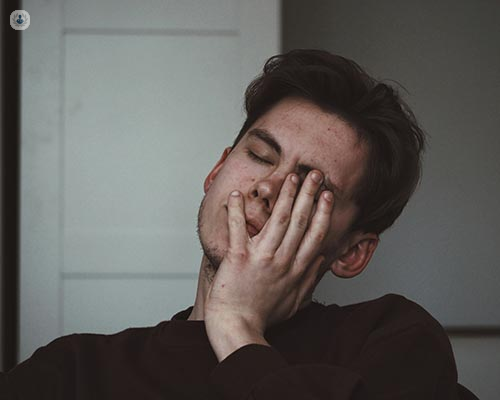Bipolar disorder: What are the signs?
Written in association with:Bipolar disorder, previously known as manic-depressive illness, is a mental health condition characterised by extreme mood swings. These mood swings include emotional highs, known as mania or hypomania, and lows, referred to as depression. During manic episodes, individuals may feel euphoric, full of energy, or unusually irritable, while depressive episodes can lead to feelings of sadness, hopelessness, and a lack of interest or pleasure in most activities.
Leading consultant paediatric and adult psychiatrist Dr Teresa Gomez Alemany explains the symptoms, diagnosis and treatment options for bipolar disorder.

What are the signs and symptoms?
The signs and symptoms of bipolar disorder can vary widely and are generally categorised into manic and depressive episodes.
During a manic episode, you might experience increased energy, reduced need for sleep, unusual talkativeness, racing thoughts, and poor decision-making, such as spending sprees or risky behaviours. Hypomania, a milder form of mania, has similar but less severe symptoms.
During a depressive episode, symptoms include prolonged sadness or emptiness, fatigue, difficulty concentrating, changes in appetite or weight, and thoughts of death or suicide. It's crucial to recognise that these symptoms can impair daily functioning and significantly affect one's quality of life.
It is important to note that, in order to meet the criteria for bipolar disorder, a manic episode should last at least 4 days and a depressive episode should last at least 2 weeks.
How is bipolar disorder diagnosed?
Diagnosing bipolar disorder involves a thorough evaluation by a mental health professional. This typically includes a physical examination, an interview, and a review of your medical history. The diagnostic process may also involve mood charting to track your emotional states over time or talking to a relative to provide objective and reliable information on your behaviour. There are different types of bipolar disorder, including Bipolar I, characterised by at least one manic episode, and Bipolar II, involving hypomanic and depressive episodes but no full-blown manic episodes.
What causes bipolar disorder?
The exact cause of bipolar disorder is not entirely understood, but it is believed to result from a combination of genetic, biological, and environmental factors. A family history of bipolar disorder increases your risk, suggesting a genetic component. Neurotransmitter imbalances in the brain also play a role, as do stressful life events and trauma, which can trigger or exacerbate the condition.
What are the treatment options?
Treatment for bipolar disorder generally includes a combination of medication and psychotherapy. Medications such as mood stabilisers, antipsychotics, and antidepressants help manage the symptoms. It may take some time to find the right medication and dosage that works best for you, and it's essential to work closely with your healthcare provider during this process.
Psychotherapy, or talk therapy, can provide support, education, and guidance to individuals with bipolar disorder and their families. Cognitive behavioural therapy (CBT) is particularly effective in helping patients recognise and change negative thought patterns and behaviours.
Additionally, lifestyle changes, such as maintaining a regular sleep schedule, exercising, and reducing stress, can support overall treatment and improve quality of life.
When should you seek help?
If you or someone you care about is showing signs of bipolar disorder, it is crucial to seek professional help without delay. Early diagnosis and treatment can greatly enhance outcomes and facilitate effective management of the condition. In a crisis situation or if you are experiencing thoughts of self-harm, contact emergency services or a mental health crisis hotline immediately. Keep in mind that bipolar disorder is a treatable condition, and with the appropriate support and treatment, individuals can lead fulfilling lives.
If you have bipolar disorder and would like to book a consultation with Dr Teresa Gomez Alemany, do not hesitate to do so by visiting her Top Doctors profile today.


